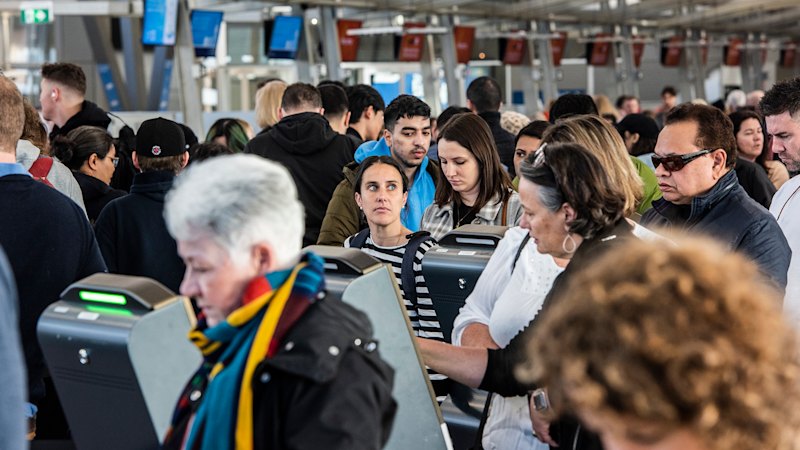
Consumer advocates have expressed concerns over the Australian government’s proposed aviation reform framework, arguing that it lacks sufficient measures to ensure airlines adequately compensate passengers for cancelled or delayed flights. The Albanese government initiated public consultation this month on a significant consumer protection scheme aimed at clarifying passengers’ rights to refunds for delayed flights.
The consultation document outlines standards that airlines and airports should adhere to, detailing criteria for when passengers may receive refunds, as well as food and drink vouchers. Despite these efforts, advocates assert that the proposed remedies fall short of adequately addressing the issue of compensation, particularly for delays and cancellations within the airlines’ control.
Adam Glezer, representing Consumer Champion, emphasized the need for clearer guidelines. He stated, “Australians deserve clarity. If an airline is at fault and we miss a funeral, wedding, holiday, work meeting, or any other important event, we should be properly compensated.” Glezer, who assists customers in obtaining refunds from airlines, criticized the current proposal, arguing that it does not deter airlines from cancelling or delaying flights they could operate.
The consumer group Choice echoed these sentiments, noting that while the government’s proposed scheme marks a long-overdue shift in consumer protection, it disappointingly lacks explicit rights to compensation for flight disruptions. “Compensation schemes in Europe have encouraged airlines to reduce avoidable delays and provide consumers with simple cash payments when flights are cancelled or late. This is something Australians also deserve,” said Rosie Thomas, director of campaigns at Choice.
The government is seeking feedback on the proposed framework until October 5 and is gathering input on potential penalties for airlines until October 26.
Eric Napoli, chief legal officer of AirHelp, a Europe-based passenger compensation company, highlighted the effectiveness of the European Union regulation EC261, which mandates compensation for delays or cancellations under certain conditions. Compensation amounts range from €250 ($447) for flights under 1,500 kilometres to €600 for longer journeys. Napoli stressed that Australia’s compensation scheme should feature “simple, clear rules” to ensure customers understand their rights.
The recently released 2024 Aviation White Paper recommended implementing consumer protections for airline passengers but noted that “mandatory compensation” is not included in the current proposals. This document followed a tumultuous period for the aviation industry, exacerbated by COVID-19 lockdowns and significant operational challenges, including the controversial firing of 1,800 Qantas workers.
The White Paper outlines various criteria for delays and disruptions, addressing issues such as tarmac delays of over 45 minutes and flight cancellations within a week of the scheduled departure. Napoli mentioned that AirHelp is considering entering the Australian market, contingent on the establishment of a fair compensation system.
The complexity of determining responsibility for delays remains a significant challenge. Delays are often caused by external factors such as extreme weather or issues involving air traffic control, airlines, or airports. Long acknowledged that the intricacies of the aviation market complicate efforts to assign fault accurately.
A spokesperson for Catherine King, Australia’s Transport Minister, stated that the proposed framework aims to enhance protections for the public while holding airlines accountable. The government’s initiative intends to focus on ensuring passengers receive adequate support during disruptions, including prompt re-bookings and timely refunds.
This consumer protection framework will set minimum standards enforceable by an Aviation Consumer Protection Authority and establish an Aviation Consumer Ombuds Scheme to address individual complaints. While some airline advocates express concern that the costs associated with this initiative could ultimately be passed on to consumers, the government intends to fund the scheme through industry levies.
According to the International Air Transport Association (IATA), the EU261 regulation costs the airline industry approximately €5 billion annually. As ticket pricing evolves to become more dynamic, it is anticipated that airlines will adjust consumer costs accordingly.
The Australian aviation market, while smaller than Europe’s, is under scrutiny as it develops its consumer protection measures. In 2024, Europe recorded 6.7 million commercial flights, compared to 1.5 million flights in Australia.
The IATA’s Albert Tjoeng acknowledged that Australia’s aviation regulatory framework is well-regarded internationally but cautioned against repeating mistakes made elsewhere. He emphasized the importance of balancing passenger rights with the need to avoid overly complex regulations that could inflate costs for both airlines and travellers.
As developments unfold, the global aviation community continues to observe Australia’s approach to aviation consumer protections, highlighting the need for clear and effective regulations that benefit passengers without imposing excessive burdens on the industry.






